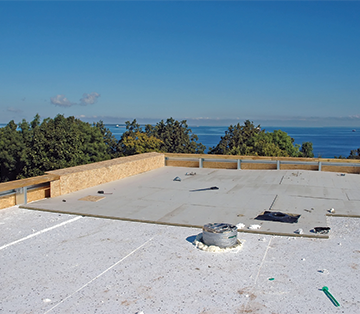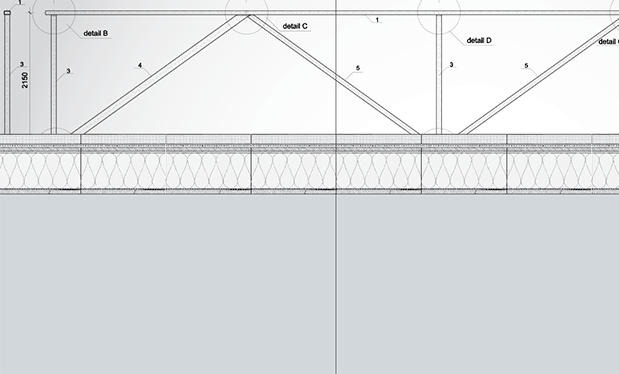
The Polyisocyanurate Insulation Manufacturers Association recently updated its QualityMark program, which has been in existence since 2004 and addresses the long-term thermal resistances of polyisocyanurate insulation used in low-slope roof systems.
What it is
PIMA’s QualityMark is a voluntary program for manufacturers of rigid board polyisocyanurate roof insulation manufactured in the U.S. and Canada. The program allows manufacturers to obtain and use third-party certification of long-term thermal resistance values, commonly referred to as LTTR, for their products. Additionally, the program provides third-party verification of R-values.
The following polyisocyanurate insulation manufacturers participate in the program:
- Atlas Roofing Corp., Meridian, Miss.
- Carlisle Construction Materials, Carlisle, Pa.
- GAF, Parsippany-Troy Hills, N.J.
- Holcim Building Envelope, Nashville, Tenn.
- IKO, Calgary, Alberta
- Johns Manville, Denver
- SOPREMA Inc., Drummondville, Québec
Rmax, Dallas, is not participating.
Testing and conformance
In the QualityMark program, samples for LTTR certification are selected from each participating manufacturer’s manufacturing plant locations. LTTR testing is conducted on 2-, 3- and 4-inch-thick products by PIMA-approved, third-party testing laboratories. The manufacturers are required to obtain initial LTTR certification for each of their manufacturing plant locations. Retesting and recertifying is done every three years. These certifications are the basis for manufacturers’ published LTTR values.
Also, samples for R-value verification are selected quarterly from normal distribution sources by a third-party testing laboratory. A representative sample is selected for each participating manufacturer’s manufacturing plant locations. After selection, samples are held and conditioned at standard laboratory conditions for 180 days. Then, the full thickness samples are tested for R-value according to ASTM C518, “Standard Test Method for Steady-State Thermal Transmission Properties by Means of the Heat Flow Meter Apparatus.”
A plant location is deemed to comply with the QualityMark program when its tested R-value at 180 days is equal to or greater than the LTTR-certified value for the same thickness of product. Plant locations receiving nonconforming R-value results in two consecutive quarters are not in conformance with the program.
This 180-day, R-value verification testing is a noteworthy update to the QualityMark Program.
In February, PIMA published its first quarterly QualityMark conformance report for April through June 2022. The lag between the reporting period and February publication date largely is attributable to the 180-day conditioning period for the R-value verification samples.
The report identified 30 manufacturing plants from seven polyisocyanurate insulation manufacturers that conformed with QualityMark. Six of these plants from two different manufacturers are identified as having a pending result for their LTTR certifications. This reportedly means they only have one quarter of successful R-value verifications under the current program procedures.
Also, three manufacturing plant locations from three manufacturers are identified as recently having been brought online; the reporting period occurred before the specific locations started commercial production, and they could not complete initial LTTR certification.
It is worth noting in addition to the manufacturer that is not participating in the program, plants from several manufacturers are not included in the list of plants and manufacturers complying with the QualityMark program. This omission indicates these specific locations did not conform with QualityMark during the reporting period.
In April, PIMA published its quarterly conformance report for July through September 2022. This report identifies 30 manufacturing plants from seven manufacturers as complying; however, these 30 plants are not the same as those identified as conforming in the previous 2022 quarterly report. One manufacturing plant location has been added, and one has been removed from the list.
Also, only two of the manufacturing plant locations from one manufacturer on the July-September 2022 conformance report are identified as having pending results for their LTTR certifications.
The status of the three manufacturing plants that recently had been brought online remain unchanged from the April-June 2022 conformance report.
My thoughts
PIMA’s revisions to its QualityMark program, including the public availability of the quarterly conformance reports, brings added credibility to the program and the participating (and conforming) manufacturers. I applaud these efforts.
However, it is unclear how manufacturers and manufacturing plant locations currently complying with the QualityMark program can be readily identified by polyisocyanurate insulation users. Use of the QualityMark designation identifies manufacturer participation in the program not manufacturer or specific manufacturing plant location conformance. Participating nonconforming manufacturers and manufacturing plant locations are still permitted to use the QualityMark label. Current conformance information should be more readily available.
Also, it is unclear how conformance can be applied to polyisocyanurate insulation procured through private-label sources. In these situations, the manufacturing plant location and original manufacturer is not readily known by users.
NRCA maintains its long-standing recommendation that rigid board insulation, including polyisocyanurate insulation, be specified and procured based on its ASTM International designation, board size and thickness and not its LTTR or R-value.
Additional information about polyisocyanurate insulation used in low-slope membrane roof systems is available in Chapter 4-Rigid Board Insulation of The NRCA Roofing Manual: Membrane Roof Systems—2023. NRCA members can download this manual free; hard copies can be purchased at shop.nrca.net.
MARK S. GRAHAM is NRCA’s vice president of technical services.
@MarkGrahamNRCA



